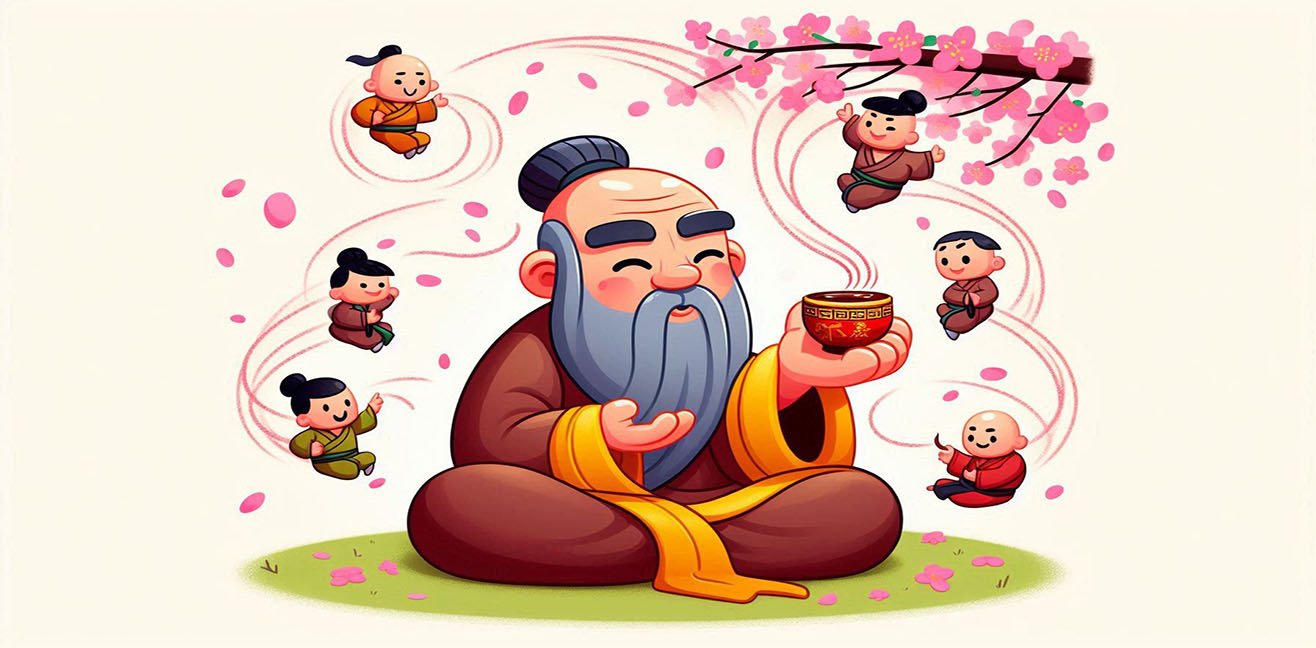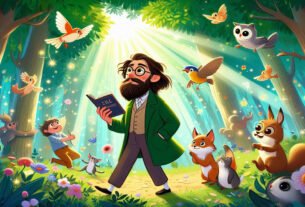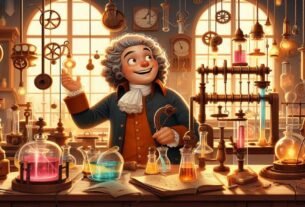Today, we embark on a profound journey into one of the cornerstones of Chinese philosophy: the ancient teachings of Confucius. This is not merely philosophy; it’s the art of giving meaning to life. ☯️ If you’re ready, let’s begin walking in the footsteps of this wise guide!
Life: A Lifetime Ascending from Ordinary to Wisdom 🛤️
Early Period: A Character Shaped by Hardships
Born in 551 BC in the state of Lu (modern-day Shandong), Kong Qiu (later known as Confucius) came from a noble but impoverished family. Losing his father at age three matured him early. In his youth, he worked in the following jobs:
- 🏛️ Clerk in state granaries
- 📊 Accountant
- 🐑 Shepherd
These experiences helped him understand the real problems of the people. His saying, “He who does not understand the people’s hunger cannot govern them,” took shape during this period.
Passion for Education and Efforts to Establish an Academy
Challenging the traditional education system, Confucius historically established a school for the first time that:
- 💰 Did not charge fees from students
- 🚻 Did not discriminate based on social status
- 📚 Combined practical and moral education
He told his students, “I want to impart not only knowledge but also virtuous character.”
Political Life and Disappointments
Between ages 51-55, he served as Minister of Justice in the state of Lu. Through his reforms, he:
- ⚖️ Prevented corruption
- 🏘️ Strengthened social justice
- 📈 Increased prosperity
However, due to political intrigues, he had to resign from his position. This marked the beginning of his 14-year exile.
Basic Philosophical Concepts: Five Cornerstones 🎯
1. Ren (Humaneness) – The Heart of Philosophy 💖
“Ren is the essence of being human. Understanding others begins with understanding oneself.”
Practical Application:
- Do not do to others what you would not want done to yourself
- Rejoice in others’ successes
- Share in their sufferings
2. Yi (Righteousness) – The Moral Compass 🧭
“Yi comes before personal gain. Doing what is right is superior to doing what is profitable.”
Daily Example:
When you find an opportunity for unjust gain at work, ask, “Is this consistent with Yi?”
3. Li (Etiquette) – Social Harmony 🤝
“Li is like the invisible threads of society. Etiquette is the language of respect.”
Modern Interpretation:
Today, Li extends from being respectful in traffic to practicing courtesy on social media.
4. Zhi (Wisdom) – Practical Intellect 🧠
“Zhi is not about knowing, but about applying what is right. Knowledge is empty if not transformed into action.”
Example:
Not just reading books, but implementing what you read in life.
5. Xin (Trustworthiness) – Foundation of Character 🌟
“Xin is the harmony between words and actions. If you make a promise, keep it.”
Political Philosophy: The Virtuous Governance Model 🏛️
Ideal Ruler Profile:
“The superior man is like the sun – giving equal warmth and light to everyone.”
Qualities Required in a Ruler:
- Self-Governance: “He who cannot govern himself cannot govern others”
- Service to People: “The people’s welfare is the ruler’s greatest responsibility”
- Leading by Example: “If the ruler walks the right path, no one will take the wrong path”
Principles of State Governance:
“If you govern people with laws, they will avoid punishments but feel no shame.
If you govern with virtue, they will feel shame and strive to be good.”
Educational Philosophy: Holistic Development 📚
Teaching Methods:
- Socratic Dialogue: “Don’t give the student fish; teach them how to fish”
- Case Study Analysis: “History is the best teacher”
- Practical Application: “Knowledge is reinforced through experience”
Equality in Education:
“There should be no class distinction in education. Every human being has an innate capacity for learning.”
Practical Advice for Daily Life 🌈
Golden Rules in Relationships:
- “Harmony in the family is the foundation of harmony in society”
- “When choosing friends, prefer the honest ones”
- “Show respect to your neighbor, and they will show respect to you”
Personal Development Tips:
- “Every day, examine yourself in three aspects: Am I loyal to others? Am I trustworthy to my friends? Am I practicing my teachings?”
- “Don’t be afraid to admit your mistakes; they are your best teachers”
Humor and Irony: The Human Side 😄
Examples of Confucius’s practical wisdom:
1. Flexible Approach:
“It’s good to have principles, but being overly rigid is not good. A tree that doesn’t bend in the wind breaks.”
2. Realism:
“You can’t cook without rice, you can’t live without principles. But you can’t be satisfied with rice alone!”
3. Self-Mockery:
“Sometimes I think so deeply that I forget to eat. Then I remember and become so happy that I forget my thoughts!”
Selected Quotes from His Works 📖
From Analects (Lunyu):
- “Is it not a pleasure to learn and to practice what you have learned?”
- “The way to acquire knowledge is to investigate the reason of everything”
- “Reviewing the old and deducing the new – this is teaching”
From Great Learning (Da Xue):
“Those who wish to reform the world must first reform their nation
Those who wish to reform their nation must first reform their family
Those who wish to reform their family must first reform themselves”
From Doctrine of the Mean (Zhong Yong):
“Balance is the law of the universe. Extremism disrupts harmony”
Poetic Expressions ✨
“The Path of the Wise”
“As the river reaches the sea,
So does humanity reach wisdom.
With patience, persistence, hope…
Every drop nourishes the ocean.” 🌊
“The Song of Learning”
“Young, you learn – with excitement,
Old, you learn – with wisdom,
Learning at every age,
Gives meaning to life.” 📚
Reflections in the Modern World 🌍
In Business:
- Leadership: “Respect your employees, and they will respect you”
- Ethics: “Long-term reputation is more important than short-term profit”
- Teamwork: “Working together is the key to success”
In Personal Relationships:
- Communication: “Know how to listen, know how to speak”
- Empathy: “Do not do to others what you would not want done to yourself”
- Trust: “Let your word be your essence, and your essence your word”
In Education:
- Lifelong Learning: “Learning doesn’t end upon graduation”
- Practical Education: “Theory and practice are like two wings”
- Character Education: “Virtue comes before knowledge”
Criticisms and Contemporary Debates ⚖️
Positive Aspects:
- ✅ Practical and applicable advice
- ✅ Strengthens social harmony
- ✅ Values moral principles
Criticized Aspects:
- ❌ Supporting traditional hierarchy
- ❌ Gender inequality
- ❌ Overly conservative approaches
Final Words: Modern Interpretation of Ancient Wisdom 💫
Confucius teaches us this: “Life is built on simple principles. We are the ones who complicate it.”
Remember:
- Know Yourself: “Knowing yourself is the beginning of all wisdom”
- Learn Continuously: “Let learning flow like a river continuously”
- Practice: “Knowledge is worthless if not transformed into action”
- Live Balanced: “Avoid extremes, find the middle way”
- Value People: “Humanity is the most valuable being in the universe”
Think of your life as a garden: Sow your seeds with wisdom, water with patience…
With endless love and the hope that your life becomes a beautiful garden of wisdom! 🌸




